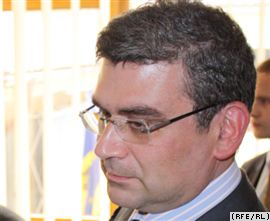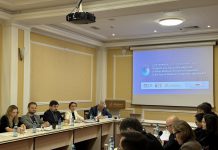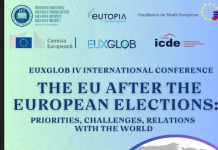Romanian Foreign Minister Teodor Baconschi says the European Union no longer suspects Bucharest of promoting a "hidden agenda" in regard to Moldova, RFE/RL’s Moldovan Service reports.
Baconschi, whose country has been accused by Moldova’s former communist government of plotting to annex it, told RFE/RL in an interview that relations between Bucharest and Chisinau are back to "normal" after almost two years of pro-European reforms pursued by Moldova’s center-right government.
He said the EU is again asking for Romania’s expertise on Moldovan issues, suggesting that Bucharest was marginalized by Brussels in the past over the communist government in Chisinau’s complaints.
Baconschi said that while his country does not have the ambition of taking direct part in the 5+2 negotiations aimed at resolving the dispute over Moldova’s breakaway Transdniester region, Romania opposes a resolution that would result in the federalization of Moldova.
The negotiations — which include Russia, Ukraine, the Organization for Security and Cooperation in Europe, the United States, and the EU — are due to resume on June 21 in Moscow after a five-year break.
The federalization solution for Transdniester, known as the "Kozak memorandum," was first proposed by Russia in 2003 but was not adopted. It offered the separatist authorities in Transdniester the option to declare independence if Moldova ever chooses to rejoin Romania.
Most of Moldova was part of Romania until World War II, when it was occupied by the Red Army and made a Soviet republic.
Baconschi said he has no official information about whether federalization will be a part of any future 5+2 talks. But he added that federalization itself would not guarantee the territorial integrity and suzerainty of Moldova, which Bucharest strongly supports.
Transdniester, where some 60 percent of the region’s 530,000 people are either ethnic Russian or Ukrainian, declared independence in 1990 and fought a brief war against Moldovan troops in 1992.







